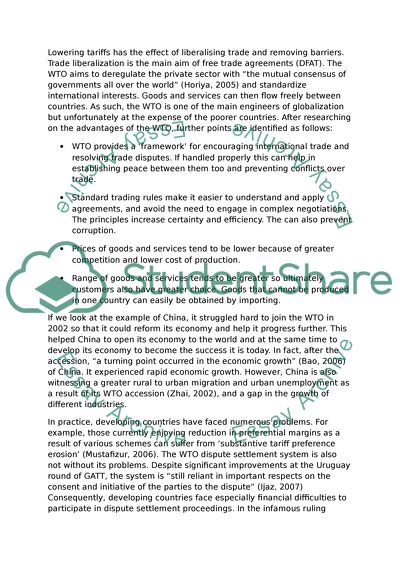Cite this document
(“The world trade organization is often accused of benefiting richer Essay”, n.d.)
The world trade organization is often accused of benefiting richer Essay. Retrieved from https://studentshare.org/miscellaneous/1556829-the-world-trade-organization-is-often-accused-of-benefiting-richer-nations-to-the-detriment-of-poorer-ones-discuss-both-the-advantages-and-disadvantages-of-joining-the-wto-and-suggest-ways-in-which-it-could-be-transformed-to-help-developing-nations-as-we
The world trade organization is often accused of benefiting richer Essay. Retrieved from https://studentshare.org/miscellaneous/1556829-the-world-trade-organization-is-often-accused-of-benefiting-richer-nations-to-the-detriment-of-poorer-ones-discuss-both-the-advantages-and-disadvantages-of-joining-the-wto-and-suggest-ways-in-which-it-could-be-transformed-to-help-developing-nations-as-we
(The World Trade Organization Is Often Accused of Benefiting Richer Essay)
The World Trade Organization Is Often Accused of Benefiting Richer Essay. https://studentshare.org/miscellaneous/1556829-the-world-trade-organization-is-often-accused-of-benefiting-richer-nations-to-the-detriment-of-poorer-ones-discuss-both-the-advantages-and-disadvantages-of-joining-the-wto-and-suggest-ways-in-which-it-could-be-transformed-to-help-developing-nations-as-we.
The World Trade Organization Is Often Accused of Benefiting Richer Essay. https://studentshare.org/miscellaneous/1556829-the-world-trade-organization-is-often-accused-of-benefiting-richer-nations-to-the-detriment-of-poorer-ones-discuss-both-the-advantages-and-disadvantages-of-joining-the-wto-and-suggest-ways-in-which-it-could-be-transformed-to-help-developing-nations-as-we.
“The World Trade Organization Is Often Accused of Benefiting Richer Essay”, n.d. https://studentshare.org/miscellaneous/1556829-the-world-trade-organization-is-often-accused-of-benefiting-richer-nations-to-the-detriment-of-poorer-ones-discuss-both-the-advantages-and-disadvantages-of-joining-the-wto-and-suggest-ways-in-which-it-could-be-transformed-to-help-developing-nations-as-we.


